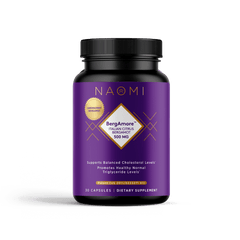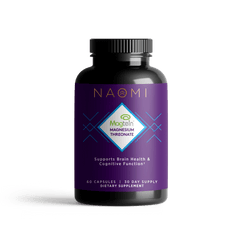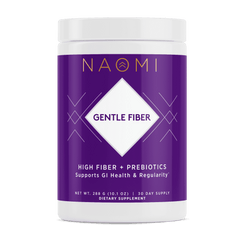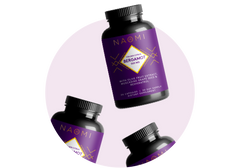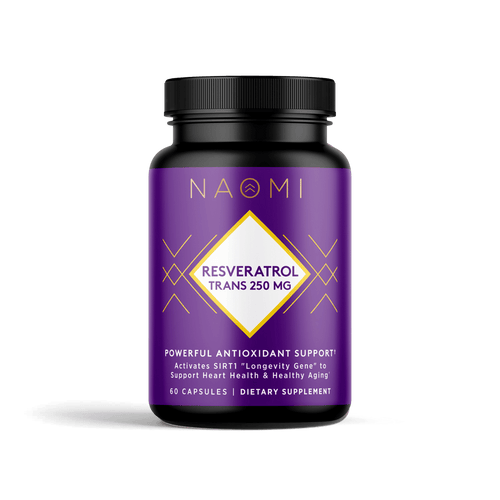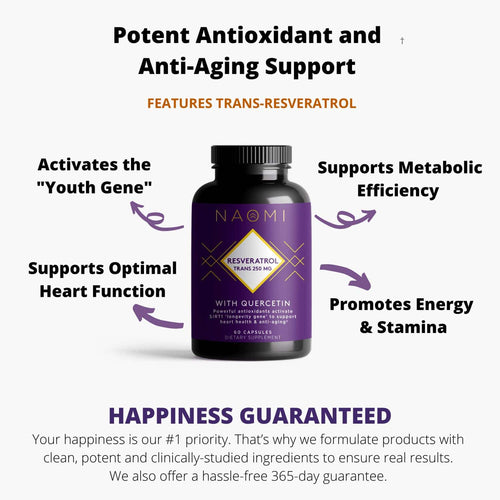Heart Disease and Women: The Role of Resveratrol
Yes, it’s a popular emoji and a common lyric in love songs, but when it comes to the human body, the heart is everything.
It pumps your blood, it delivers nutrients via your blood vessels, it races when you’re nervous (or in love), and it keeps on working every minute, every hour, and every day. Pumping, thumping, churning. Every beat matters.
So it’s no wonder that heart disease—in all of its forms—is such a major health concern and threat. When something goes wrong with your heart, it’s not like a bruise, break, or blister. It’s a big deal.
And sometimes, the hardest part is that you may never even see the trouble coming.
That’s why it’s crucial that you pay special attention to your heart—and how you treat it.
I became especially interested in heart disease after learning about what is called “The French Paradox,” which was a term used frequently in the 1980s. That was a time when people wondered why French people had less heart disease.
It turns out that one factor was that they consumed a lot of the compound resveratrol—a polyphenol found in red wine and dark chocolate. That may sound like a romantic food pairing you’d order at an outdoor café in Paris, but it was more than that: Those foods didn’t just make the heart grow fonder; they made the heart grow stronger. Over time, studies showed that resveratrol—found in grape skins, dark chocolate, peanut skins, and berries—had a positive influence in reducing the risk of heart disease.
Cardiovascular Disease: The Big Picture
The phrase “heart disease” is sort of like the phrase “social media.” It’s a big term that applies to a lot of different forms, not just one thing. Heart disease can refer to coronary artery disease, in which clogged blood vessels can lead to heart attacks. It can also refer to irregular rhythms of the heart (called arrhythmias), as well as other kinds of heart malfunctions.[*]
Coronary artery disease is what many people often think about when they think of heart troubles. That happens when plaque builds up on the wall of the arteries. This actually happens because the plaque is attempting to repair some kind of damage to the artery wall (like too much blood sugar or smoking, which can damage the arteries).[*]
That plaque buildup, if not cleared from the arterial tunnels, builds and builds (it’s made up of cholesterol and other compounds). And that’s what causes the blockage and narrowing of arteries. That, as you might imagine, is like having a chip of ice get stuck in a straw: It restricts flow. That’s not a big issue for your smoothie, but when blood can’t move through your blood vessels, nutrients and oxygen can’t get where they need to go. And that’s a problem that can cause chest pain, heart attacks, and strokes.
Risk Factors for Cardiovascular Disease
When you lump all of the different forms of heart disease together, it’s probably not surprising that heart disease is the leading cause of death for both men and women.[*] The CDC reports that almost half of Americans have at least one risk factor for heart disease.
- Smoking
- Unhealthy diet
- Lack of physical activity
- Some medical conditions, like diabetes and obesity
- Excessive alcohol use
- High blood pressure
- High LDL cholesterol and low HDL cholesterol
- Family history, ethnicity, gender, age
Women and Heart Disease
Heart disease is the leading cause of death for women in the United States, killing about 300,000 women in 2017—or about 1 in every 5 female deaths.[*] Now, what’s especially interesting is that women often experience different signs and symptoms of heart disease than men, specifically with regards to coronary artery disease and other cardiovascular diseases. One study found that the top symptoms for women who had heart attacks didn’t include “classic” heart attack symptoms such as chest pain and tingling. Instead, the study reported that women were more likely to say they experienced anxiety, sleep disturbances, and unusual or unexplained fatigue (which can be symptoms of so many other things that it makes being aware of heart troubles so tricky).[*]
Common heart disease symptoms in women include:
- dizziness
- paleness
- shortness of breath or shallow breathing
- lightheadedness
- fainting or passing out
- anxiety
- nausea
- vomiting
- jaw pain
- neck pain
- back pain
- indigestion or gas-like pain in the chest and stomach
- cold sweats
Resveratrol Benefits and Heart Disease
In 1963, a Japanese scientist extracted resveratrol from Japanese knotweed, the roots of which have been used for centuries in traditional medicine to treat cardiovascular diseases and liver ailments. (In addition, Itadori tea, one significant source of resveratrol, has long been used in Asian countries, including Japan and China, as a traditional herbal remedy for preventing heart disease and strokes.)
Since then, more and more research has shown resveratrol—the polyphenol found in red wine and dark chocolate—to help decrease the risk of heart disease.
Cholesterol and Atherosclerosis: Atherosclerosis refers to the buildup of fats, cholesterol and other substances in and on your artery walls (aka plaque), which can restrict blood flow.[*] This is related to the formation of plaque that can cause coronary artery disease and stroke. One animal study showed that resveratrol, through a variety of mechanisms, can help increase good HDL cholesterol (which helps clear some of that plaque).[*] Other research shows that it can even help reduce arterial plaque. And more research shows that resveratrol had an influence on changing a variety of factors that are linked to heart disease, including lowering glucose levels, LDL cholesterol, and blood pressure, while improving good HDL cholesterol and insulin sensitivity.[*][*][*]
Hypertension: High blood pressure—a major risk factor for heart disease—also appears to be influenced by resveratrol, though more research needs to be done. For example, a meta-analysis of six randomized controlled trials showed that resveratrol benefits include decreased blood pressure, by specifically decreasing our systolic blood pressure (the maximum pressure your heart exerts while beating).[*] And several studies have shown that it can improve various structures and functions within the heart that can improve blood flow and pressure.[*][*]
Inflammation: Resveratrol has been shown to activate a protein that protects against oxidative damage caused by inflammation, and other research has shown that the antioxidant properties of resveratrol resulted in a decrease of LDL oxidation (this is a process that contributes to the formation of plaque).[*][*] Resveratrol was also found to be an effective scavenger of damaging free radicals, helping decrease inflammation by doing so.[*][*]
Blood Vessel Function: Resveratrol has been shown to reduce vascular inflammation and improve epithelial function, which improves blood flow and blood pressure, and it also appears to have a role in relaxing tight, stiff blood vessels (by having an effect on calcium and potassium, which play a role in arterial function), so that blood can flow more easily.[*][*] Resveratrol was also shown to inhibit the production of internal compounds that promote the narrowing of blood vessels, called vasoconstrictors, such as refined carbs. Because of this inhibition, resveratrol benefits may include helping regulate blood vessel dilation, which is impaired in atherosclerosis.[*]

